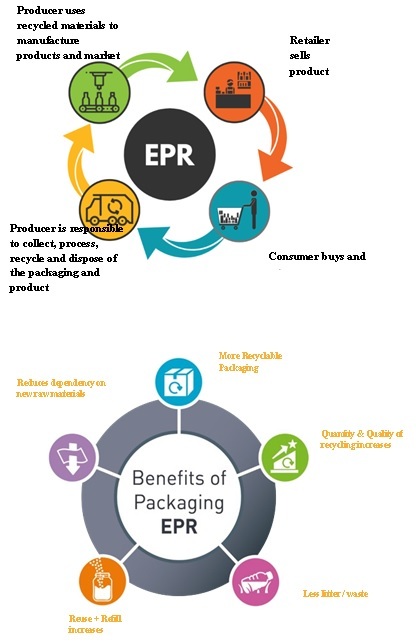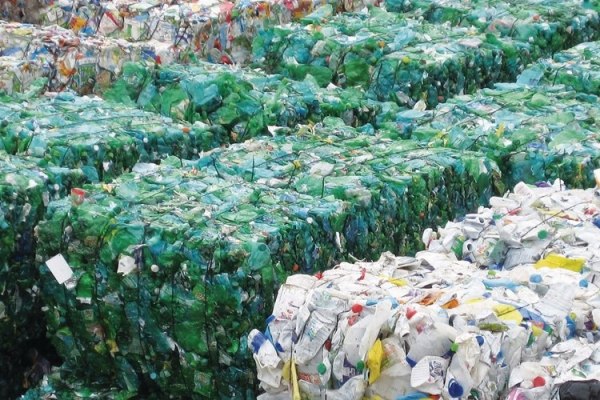 In the intricate landscape of India’s waste management, the informal sector has long played a pivotal role in the collection and recycling of plastic waste. However, with the country producing approximately 9.46 million tonnes of plastic waste annually, the need for structured and enforceable solutions has become urgent. This is where Extended Producer Responsibility (EPR) steps in as a game-changer. In this article, Nikhila Vishnuvajhala, Assistant General Manager of Business Development & Sales at Banyan Nation, highlights that EPR policies hold manufacturers accountable for the entire lifecycle of their products, fostering innovation, reducing plastic pollution, and contributing to economic growth. The urgency to implement EPR compliance is paramount, not only to capitalize on an $8 billion economic opportunity but also to ensure a sustainable future for India.
In the intricate landscape of India’s waste management, the informal sector has long played a pivotal role in the collection and recycling of plastic waste. However, with the country producing approximately 9.46 million tonnes of plastic waste annually, the need for structured and enforceable solutions has become urgent. This is where Extended Producer Responsibility (EPR) steps in as a game-changer. In this article, Nikhila Vishnuvajhala, Assistant General Manager of Business Development & Sales at Banyan Nation, highlights that EPR policies hold manufacturers accountable for the entire lifecycle of their products, fostering innovation, reducing plastic pollution, and contributing to economic growth. The urgency to implement EPR compliance is paramount, not only to capitalize on an $8 billion economic opportunity but also to ensure a sustainable future for India.
Read the full article for deeper insights:
The Urgency to Implement EPR Compliance
In India, the collection of post-consumer plastic waste is a complex process deeply intertwined with the informal sector, which plays a crucial role in the country’s circular economy.
Annually, India produces around 9.46 million tonnes of plastic waste, of which about 60%-70% is recycled, largely due to the efforts of the informal sector. This sector consists of ragpickers, waste pickers, and small-scale recyclers who collect, sort, and sell plastic waste to recycling units. Informal waste collectors traverse neighborhoods, collecting plastic waste from various sources, often with minimal support andrecognition from formal systems. Municipalities either use their own collection services or contract private waste management companies.
Informal collectors sell materials to the nearest aggregators, who determine market prices based on local demand and supply. Aggregators then sell the material, including plastics, to larger aggregators, intermediate dealers, or other agents.
India is estimated to have more than 7,500 registered and unregistered recyclers. The informal sector’s contribution is vital, not only in terms of the volume of plastic waste managed but also in providing livelihoods to millions of waste pickers and small-scale recyclers across the country.
 The Plastic Waste Management Rules 2016 and the recently strengthened Extended Producer Responsibility (EPR) guidelines position India as a leader in addressing plastic pollution. As environmental concerns intensify and regulatory landscapes evolve, the urgency to implement EPR compliance has never been more critical.
The Plastic Waste Management Rules 2016 and the recently strengthened Extended Producer Responsibility (EPR) guidelines position India as a leader in addressing plastic pollution. As environmental concerns intensify and regulatory landscapes evolve, the urgency to implement EPR compliance has never been more critical.
What is EPR?
EPR is an environmental policy approach that holds manufacturers, producers, and importers accountable for the entire lifecycle of their products, particularly their end-of-life management. This includes the collection, recycling, and disposal of products in an environmentally responsible manner.While other countries faced conflicting economic and political priorities, resulting in inaction, India implemented a comprehensive EPR policy.
Due to the enforcement of EPR, in the last three years, established entrepreneurs and startups in the industry have developed advanced capabilities to deliver safely recycled materials, developed traceable supply chains, and worked with various players in the plastics ecosystem to establish a playbook for use of recycled plastics. Without a policy led push for recycling – India would lose an $8 billion economic opportunity.
Effects of EPR Regulations in India on Brand Owners:
1. Increased Accountability and Compliance Costs - According to a report by FICCI, the cost of compliance for brand owners can range from 0.5% to 2% of their total revenue, depending on the scale of their operations and the amount of plastic packaging used.
2. Design and Material Innovation - A survey conducted by the Confederation of Indian Industry (CII) found that 60% of brand owners have invested in developing sustainable packaging solutions since the introduction of EPR regulations.
3. Enhanced Corporate Image and Consumer Trust - A study by the Indian Institute of Management (IIM) Ahmedabad revealed that 70% of consumers prefer products with sustainable packaging, and 55% are willing to pay a premium for such products.
Effects of EPR Regulations in India on Producers:
1. Operational Changes and Compliance Costs - Ministry of Environment, Forest and Climate Change (MoEFCC) estimates that the implementation of EPR could increase operational costs for producers by approximately 5-10% due to the need for new waste management systems and compliance monitoring.
2. Innovation in Packaging Solutions - According to a report by the Indian Packaging Institute, 45% of producers have started using recyclable materials and 30% have reduced plastic content in their packaging since the introduction of EPR.
3. Collaboration and Supply Chain Adjustments - A study by the National Institute of Industrial Engineering (NITIE) indicates that 50% of producers have entered new partnerships with waste management and recycling firms to comply with EPR regulations.
How will EPR help the fight against plastic pollution:
EPR regulations in India require producers to take responsibility for the collection and recycling of plastic waste, leading to higher recycling rates.When the EPR regulation comes into effect and meets the targets that are prescribed, an equallyproportionate amount of plastic waste would be diverted from landfills, contributing to a cleaner and more sustainable India.
Based on the category, the EPR regulations dictate that brand-owners commit to recycling. While this is achievable, the composition of waste collected in certain packaging formats may not be suitable (due to structure) for recycling. This has led to an increased awareness amongst manufacturers and brand owners since EPR encourages producers to design products that are easier to recycle.
The implementation of EPR policies fosters the growth of industries and jobs related to recycling and waste management.The recycling sector in India is estimated to employ around 1.5 million people, with the potential to create thousands of additional jobs through improved EPR implementation.This job creation supports economic growth and provides livelihoods, particularly in the informal sector, which plays a crucial role in waste management.
By promoting the recycling of plastics and the use of recycled materials, EPR helps reduce the carbon footprint associated with plastic production.Recycling plastics saves up to 80% of the energy required to produce new plastics from virgin materials.Reduced emissions contribute to India’s commitments under the Paris Agreement to combat climate change.
EPR leads to the development of better-organized and more efficient waste management systems, funded by the producers themselves.Investments in waste management infrastructure through EPR are projected to increase by 20%, improving the capacity to handle and process plastic waste. Enhanced infrastructure ensures more plastic waste is collected and recycled, reducing environmental pollution and improving public health.





 In the intricate landscape of India’s waste management, the informal sector has long played a pivotal role in the collection and recycling of plastic waste. However, with the country producing approximately 9.46 million tonnes of plastic waste annually, the need for structured and enforceable solutions has become urgent. This is where Extended Producer Responsibility (EPR) steps in as a game-changer. In this article, Nikhila Vishnuvajhala, Assistant General Manager of Business Development & Sales at Banyan Nation, highlights that EPR policies hold manufacturers accountable for the entire lifecycle of their products, fostering innovation, reducing plastic pollution, and contributing to economic growth. The urgency to implement EPR compliance is paramount, not only to capitalize on an $8 billion economic opportunity but also to ensure a sustainable future for India.
In the intricate landscape of India’s waste management, the informal sector has long played a pivotal role in the collection and recycling of plastic waste. However, with the country producing approximately 9.46 million tonnes of plastic waste annually, the need for structured and enforceable solutions has become urgent. This is where Extended Producer Responsibility (EPR) steps in as a game-changer. In this article, Nikhila Vishnuvajhala, Assistant General Manager of Business Development & Sales at Banyan Nation, highlights that EPR policies hold manufacturers accountable for the entire lifecycle of their products, fostering innovation, reducing plastic pollution, and contributing to economic growth. The urgency to implement EPR compliance is paramount, not only to capitalize on an $8 billion economic opportunity but also to ensure a sustainable future for India. The Plastic Waste Management Rules 2016 and the recently strengthened Extended Producer Responsibility (EPR) guidelines position India as a leader in addressing plastic pollution. As environmental concerns intensify and regulatory landscapes evolve, the urgency to implement EPR compliance has never been more critical.
The Plastic Waste Management Rules 2016 and the recently strengthened Extended Producer Responsibility (EPR) guidelines position India as a leader in addressing plastic pollution. As environmental concerns intensify and regulatory landscapes evolve, the urgency to implement EPR compliance has never been more critical..jpg)










.jpg)



